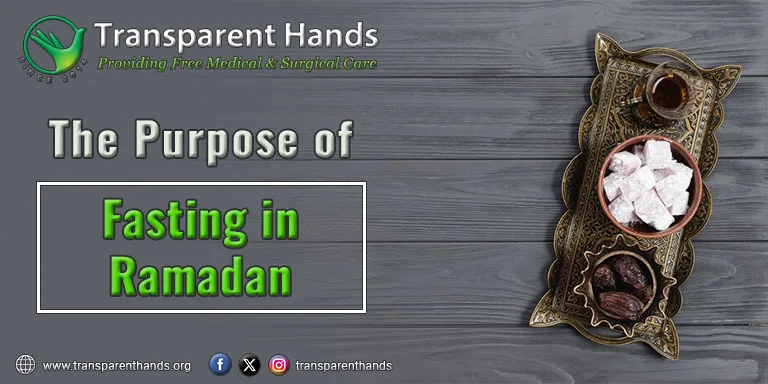Purpose of Fasting in Ramadan

Fasting is an obligatory practice in Islam. It is the fourth pillar of Islam and is ordained in the Quran. Believers are required to abstain from eating, drinking, physical intimacy, and all kinds of immoral acts from dawn (fajr) till sunset (maghrib). Fasting in Ramadan is a spiritually and morally rewarding practice that achieves specific purposes. Let’s explore some of these purposes.
The Pursuit for Taqwa
The major purpose of fasting in Ramadan is clearly defined in the Quran in the following verse:
“O you who have believed, decreed upon you is fasting as it was decreed upon those before you that you may become righteous –“ (Surat Al-Baqarah, 2:183)
The verse states that fasting is primarily for the purpose of becoming righteous or attaining ‘taqwa’, which requires believers to be constantly conscious of Allah’s (SWT) presence. Someone who strives for taqwa pleases Allah (SWT) by becoming a better human being.
The Quran tells the believers:
“Indeed, the most noble of you in the sight of Allah is the most righteous of you. Indeed, Allah is Knowing and Acquainted.” (Surat Al-Ĥujurāt, 49:13)
The following Hadith tells Muslims to strive for taqwa during fasting.
It was narrated from Abu Hurairah that the Messenger of Allah (ﷺ) said: “Whoever does not give up evil and ignorant speech, and acting in accordance with that, Allah has no need of his giving up his food and drink.” (Sunan Ibn Majah, 1689)
Do you want to Donate in every Ashra of the Ramadan Calendar?
Fasting Promotes Self-control
Fasting isn’t meant to be a mere abstinence from food and drinks. It is meant to develop a lasting change in believers’ behavior and attitude, and they must mindfully and willfully act in accordance with the ethical standards prescribed by Islam. In another Hadith, Muslims are further instructed to practice self-control and patience while fasting:
Abu Hurairah (May Allah be pleased with him) reported: The Messenger of Allah (ﷺ) said, “When any one of you is observing Saum (fasting) on a day, he should neither indulge in obscene language nor should he raise the voice; and if anyone reviles him or tries to quarrel with him he should say: ‘I am observing fast.”‘ [Al-Bukhari and Muslim]. (Riyad as-Salihin, 1240)
Some people lose their temper while fasting. The Hadith forbids believers from losing control even when they are offended. So, one of the central objectives of fasting is to prevent temper tantrums and obscenities. Obeying Allah (SWT) should be the central motive for all Muslims, and the month of Ramadan allows Muslims to practice this repeatedly.
Striving for Redemption
Another purpose of fasting in Ramadan is to strive for redemption. For believers, eternal life matters more than the mortal one. Fasting promises Redemption. The theme of the second Ashra of Ramadan is Redemption, while the last Ashra promises safety from hell.
Narrated Abu Huraira: Abu Huraira reported Allah’s Messenger (ﷺ) as saying: “When it is the month of Ramadan, the gates of mercy are opened, and the gates of Hell are locked and the devils are chained.” (Sahih Muslim, 1079b)
Another Hadith confirms that fasting in Ramadan with sincere faith will give several rewards.
Narrated Abu Huraira: Allah’s Messenger (ﷺ) said, “Whoever observes fasts during the month of Ramadan out of sincere faith, and hoping to attain Allah’s rewards, then all his past sins will be forgiven.” (Sahih al-Bukhari, 38)
Your Ramadan Donations Can Heal Lives
Important Duas
The following are some Duas (supplications) that should be recited during Ramadan to maximize the rewards of fasting.
Dua for fasting in Ramadan:
The following is the dua for fasting in Ramdan (Note that this dua isn’t derived from the Quran or the Hadith, but it is a supplication to intend for keeping a fast):
وَبِصَوْمِ غَدٍ نَّوَيْتُ مِنْ شَهْرِ رَمَضَانَ
“I intend to keep the fast for tomorrow in the month of Ramadan”
Dua for opening fast in Ramadan:
The following is the dua to break fast in Ramadan at Iftar:
ذَهَبَ الظَّمَأُ وَابْتَلَّتِ الْعُرُوقُ وَثَبَتَ الأَجْرُ إِنْ شَاءَ اللَّهُ
“The thirst is gone, the veins are moistened, and the reward is confirmed, if Allah wills.” (Abu Dawud 2/306)
Why Donate to Transparent Hands?
Transparent Hands offers free medical and surgical care to Pakistan’s most deserving patients. We organize free medical camps and provide free surgeries and various treatments. Our crowdfunding platform uniquely allows you to see who you are helping and understand how your contributions impact their lives. We collect Zakat, Sadaqah, and other forms of donations and use them in compliance with Sharia laws. Your donations can change lives and give hope to many.
Empower Patients with Your Zakat Donations
Conclusion:
Fasting has several physical and spiritual advantages. It is the fourth pillar of Islam. Muslims fast during Ramadan from dawn (fajr) to sunset (maghrib), abstaining from goods, drinks, physical intimacy, and unethical practices. The purpose of fasting is the attainment of taqwa. It is a training in self-restraint, self-control, discipline, and gratitude to Allah (SWT). The Quran and the Hadiths instruct believers to improve their ethical standards by practicing taqwa during their fasts. Ramadan provides Muslims a great opportunity to transcend the mundane and focus on the larger and more important questions about how life should be lived.











Leave Your Comments